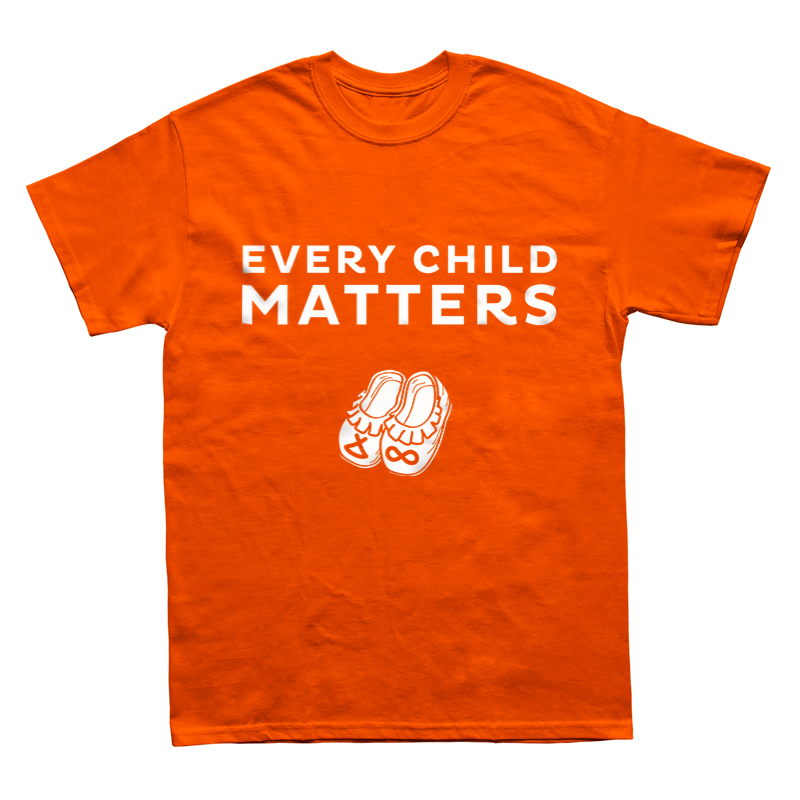In This Article
- 1 The Significance of Orange Shirt Day
- 2 The Story of Phyllis Webstad and the St. Joseph’s Residential School
- 3 Plans for Orange Shirt Day 2024: Events and Activities
- 4 The Role of Education in Truth and Reconciliation
- 5 The 2024 Every Child Matters Orange Shirt Design Contest
- 6 Commemorative Projects: The Orange Jersey Project and Beyond
- 7 Indigenous Voices and Stories: Key to Understanding the Impact
- 8 How to Get Involved and Support Indigenous Communities
The Significance of Orange Shirt Day
Orange shirt day 2024! Orange Shirt Day is a vital national movement in Canada. It takes place annually on September 30th. This day brings together Indigenous and non-Indigenous people. They unite to honor residential school survivors and their communities. The day has deep roots in the story of a young girl named Phyllis Webstad. On her first day at St. Joseph’s Residential School, her beloved orange shirt was taken from her. This event symbolizes the loss experienced by Indigenous children over generations. Orange Shirt Day aims to foster reconciliation and remember the atrocities of residential schools. It educates Canadians about the harsh realities these schools imposed. The day is not just about remembrance but also about starting conversations. These conversations can lead to healing and undoing the impacts of those schools. Cultural activities, educational events, and community gatherings mark this significant day. Through these activities, everyone can contribute to a future that respects and acknowledges Indigenous histories and rights. In summary, Orange Shirt Day serves several vital roles. It is a day of education, remembrance, and active engagement in the journey towards reconciliation.

The Story of Phyllis Webstad and the St. Joseph’s Residential School
Orange Shirt Day’s origins are both profound and personal. It traces back to the experience of Phyllis Webstad from the Stswecem’c Xgat’tem First Nation. Phyllis was six years old when she walked into St. Joseph’s Residential School in 1973, wearing an orange shirt gifted by her grandmother. Tragically, authorities took her shirt away on her first day. This incident is a symbol of the wider experience of Indigenous children at residential schools across Canada. The schools aimed to assimilate Indigenous youth into Canadian society. They often stripped away culture, language, and identity. In these schools, children suffered neglect and abuse.
In 2013, forty years after her first day at St. Joseph’s, Phyllis chose to share her story. She spoke out, sparking a movement of remembrance and education called Orange Shirt Day. On this day, we wear orange to stand in solidarity with Phyllis and thousands of residential school survivors. The color orange has come to represent the healing journey and the affirmation that every child matters. It’s now a symbol of the resilience of Indigenous communities in the face of adversity.
Remembering this story is crucial as we approach Orange Shirt Day 2024. Phyllis Webstad’s story is a powerful reminder of our collective responsibility. We must ensure that the history of residential schools remains forefront. It also teaches us to listen to survivors and honor their experiences. Education and understanding are key. They help society to move towards healing and reconciliation. On Orange Shirt Day, we come together to honor stories like Phyllis’s. We reflect on the legacy of schools like St. Joseph’s and how they impacted Indigenous children and their families for generations.

Plans for Orange Shirt Day 2024: Events and Activities
As Orange Shirt Day 2024 approaches, an array of meaningful events and activities are planned. In particular, these initiatives aim to bring communities together and amplify the message of truth and reconciliation. Here is a glimpse of what to expect:
Firstly, a T-Shirt Design Contest will take place, featuring a new ‘Every Child Matters’ T-shirt design that will be unveiled. Not only does this commemorate the day, but it also promotes awareness. This contest not only engages artists but also fosters a creative dialogue about the day’s importance.
Additionally, community gatherings will be organized in many cities and by various organizations. These events offer spaces for sharing stories, celebrating cultures, and learning from one another.
Moreover, educational workshops focused on the history and legacy of residential schools will provide valuable insights. Thus, they aim to educate both Indigenous and non-Indigenous attendees.
For those unable to attend in person, virtual webinars will be available. Consequently, a series of online events will further ensure wide accessibility.
Furthermore, art installations will be showcased in public spaces, creating visible reminders of the day’s significance. In this way, they serve as permanent tributes to the survivors.
Lastly, fundraising efforts will be undertaken to aid Indigenous student programs and support the continuation of cultural practices.
Overall, these events and activities not only observe the day but also support ongoing education and healing efforts. They fundamentally reflect a commitment to ensuring that the harsh realities and impacts of residential schools are never forgotten. By participating, we can all contribute to the journey towards a reconciled Canada where every child truly matters.
The Role of Education in Truth and Reconciliation
Education is a powerful tool for fostering understanding and promoting truth and reconciliation. As we look forward to Orange Shirt Day 2024, the role of education takes center stage in these efforts. Engaging in educational activities helps to shed light on the history of residential schools and their lasting effects on Indigenous communities. Here are key educational initiatives to engage with around Orange Shirt Day 2024:
- School Programs: Schools will engage students in learning about the history and ongoing impact of residential schools. Interactive programs and lesson plans will be available to teachers.
- Public Talks and Discussions: Experts and survivors will share their stories and knowledge. Many communities will organize talks that are open to all audiences.
- Museum and Gallery Exhibitions: Exhibits centered on the legacy of residential schools will provide visual education. These exhibits will showcase historical documents, artifacts, and art.
- Educational Resources: Libraries and online platforms will offer books, films, and other materials. These resources will help individuals learn more about the subject matter at their own pace.
- Social Media Campaigns: Informative posts and hashtags will spread awareness on platforms like Twitter and Instagram. These campaigns reach a wide audience and encourage sharing of information.
This educational push ensures that the truths of Canada’s past are widely recognized. Education empowers people to acknowledge historical injustices and contribute to the healing process. Engaging with these initiatives around Orange Shirt Day honors the past and supports Indigenous futures. It is a crucial step towards a reconciled nation where ‘Every Child Matters’ is not just a slogan, but a reality.

The 2024 Every Child Matters Orange Shirt Design Contest
As Orange Shirt Day 2024 approaches, creative energies are channeling into the ‘Every Child Matters’ T-shirt design contest. This contest is an integral part of the ceremonies, focusing on raising awareness through art. It invites artists and designers to contribute impactful designs that embody the spirit of reconciliation and remembrance.
Contest Details
The competition will launch early in the year; therefore, this timing will allow ample time for entries. Furthermore, participants are encouraged to incorporate elements that resonate with the theme of Orange Shirt Day. These elements include, for example, symbols of healing, resilience, and the acknowledgment of the experiences of residential school survivors. Ultimately, the winning design will become the official Orange Shirt Day 2024 T-shirt.
Participation and Importance
Engaging in this contest provides an artistic avenue to express support for the survivors and ongoing reconciliation efforts. It’s also a chance for artists to showcase their understanding and commitment to the message that every child matters. Schools, community groups, and individuals are all welcome to submit their designs. The chosen design will not only be a symbol for the day but also contribute to the wider conversation on Indigenous rights and history.
The contest serves as a reminder that art can be a powerful tool for change and education. It highlights the importance of acknowledging the past while moving towards a reconciled future. As the community comes together to select a design, they reaffirm their commitment to never forgetting the lessons of history.
Commemorative Projects: The Orange Jersey Project and Beyond
To ensure the lessons and legacies of residential schools remain alive, various commemorative projects play a vital role. Orange Shirt Day 2024 embraces such initiatives, extending the reach of awareness and education beyond a single day. One standout project is the Orange Jersey Project.
The Orange Jersey Project
This initiative leverages the influential power of sports to convey a message of reconciliation and healing. Sports teams wear orange jerseys to show solidarity with Indigenous communities. This act honors survivors and promotes the idea that ‘Every Child Matters.’ It’s a visual and impactful statement witnessed by countless spectators.
Beyond Orange Jerseys: Artworks, Monuments, and More
Other projects include public artworks and monuments thoughtfully placed to invite reflection. Art installations may interpret the experiences of Indigenous peoples, offering poignant insights. Permanent, physical structures ensure survivors’ stories endure. Such monuments often become places for people to gather, remember, and commit to reconciliation.
Together, these projects contribute to a culture of remembrance and action. They encourage society to engage with Indigenous histories continually. As we anticipate Orange Shirt Day 2024, let’s embrace these efforts and the change they inspire. These projects are more than memorials; they’re stepping stones towards a future of mutual respect and understanding.
Indigenous Voices and Stories: Key to Understanding the Impact
Indigenous voices and stories illuminate the enduring impacts of residential schools. These narratives are vital in understanding the true scope and depth of the consequences these schools had on Indigenous communities. By hearing directly from survivors, their families, and their communities, we gain insight not just into the past, but also into the ongoing challenges and strengths of Indigenous peoples.
Survivor Testimonies
Survivors’ stories provide a firsthand account of the residential school experiences. These testimonies serve as powerful reminders of the resilience of Indigenous peoples. They also highlight the need for ongoing support and recognition.
Family and Community Stories
Family and community narratives reveal the broader impact of residential schools. They show how the schools’ legacy affects not just individuals but entire communities. This includes generational trauma and the efforts towards healing and reconciliation.
Artistic Expression
Many Indigenous artists use their crafts to communicate their stories and the histories of their people. Art becomes a means of expressing pain, healing, and resistance. It also serves as a significant educational tool.
The Importance of Listening
Listening to Indigenous voices is crucial. It helps non-Indigenous people understand the depth of the wrongs committed and the strength required to heal. It also shows respect and recognition of the dignity and rights of Indigenous people.
By centering Indigenous voices, Orange Shirt Day not only commemorates a history of pain but also celebrates a future of resilience and hope. Engaging with these stories allows everyone to participate in the journey toward true reconciliation.
How to Get Involved and Support Indigenous Communities
Participating in Orange Shirt Day 2024 is a powerful way to support Indigenous communities. Here are several ways to get involved:
- Wear Orange: On September 30th, wear an orange shirt to show your support.
- Educate Yourself: Learn about the history of residential schools and their effects on Indigenous peoples.
- Attend Events: Go to Orange Shirt Day events and activities in your area.
- Support Indigenous Artists: Buy art from Indigenous creators, especially those reflecting Orange Shirt Day themes.
- Spread the Word: Share information and stories about Orange Shirt Day on social media.
- Donate: Give to charities working towards Indigenous education and reconciliation.
- Volunteer: Offer your time to Indigenous organizations needing help.
- Listen to Stories: Listen to the experiences of residential school survivors.
These actions help promote the message that every child matters. They also keep the conversation on truth and reconciliation going beyond just one day.


